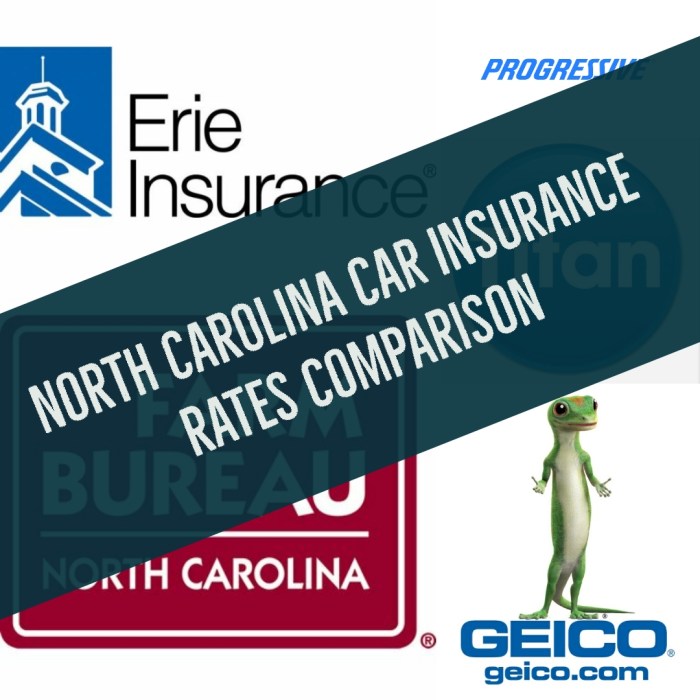
Securing the right car insurance in North Carolina is crucial for responsible driving and financial protection. Understanding the state’s specific requirements, coverage options, and cost factors can significantly impact your peace of mind and your wallet. This guide delves into the intricacies of North Carolina car insurance, equipping you with the knowledge to make informed decisions and secure the best possible coverage for your needs.
From mandatory liability coverage and the impact of driving history on premiums to exploring various coverage types and finding the most affordable options, we’ll cover everything you need to know. We’ll also discuss strategies for saving money, navigating the claims process, and understanding the complexities of SR-22 requirements.
North Carolina Insurance Requirements
Driving in North Carolina requires carrying a minimum amount of liability insurance to protect yourself and others. Understanding these requirements is crucial for legal and financial safety. Failure to comply can result in significant penalties.
North Carolina mandates that all drivers carry liability insurance, which covers damages you cause to others in an accident. This coverage is divided into bodily injury liability and property damage liability. The minimum required coverage is $30,000 per person for bodily injury, $60,000 per accident for bodily injury, and $25,000 for property damage. This means that if you cause an accident resulting in injuries to one person, your insurance will pay a maximum of $30,000; if multiple people are injured, the maximum payout is $60,000 total. For property damage, the maximum your insurance will pay is $25,000.
Insufficient Minimum Coverage Examples
While the minimum coverage might seem sufficient, several scenarios demonstrate its limitations. Consider an accident where you cause serious injuries to multiple people requiring extensive medical care and rehabilitation. The $60,000 limit could be quickly exhausted, leaving you personally liable for the remaining costs, potentially amounting to hundreds of thousands of dollars. Similarly, if you cause significant damage to multiple vehicles or property, the $25,000 property damage limit might not cover the full extent of the repairs or replacements needed. In a case where a driver caused an accident resulting in $100,000 in medical bills and $50,000 in property damage, the minimum coverage would leave the at-fault driver responsible for $75,000 out-of-pocket.
Penalties for Driving Without Insurance
Driving in North Carolina without the required insurance is a serious offense. Penalties can include significant fines, license suspension, and even vehicle impoundment. The exact penalties vary depending on the specifics of the offense and the driver’s history, but they can substantially impact your driving privileges and finances. For example, a first-time offense might result in a fine of several hundred dollars, while subsequent offenses can lead to much higher fines and longer license suspensions. Additionally, insurance companies often charge significantly higher premiums to drivers with prior uninsured driving convictions.
Liability Limits Comparison
| Coverage Type | Minimum Limit | Recommended Limit | Maximum Possible Limit (Example) |
|---|---|---|---|
| Bodily Injury (per person) | $30,000 | $100,000 | Varies by policy |
| Bodily Injury (per accident) | $60,000 | $300,000 | Varies by policy |
| Property Damage | $25,000 | $100,000 | Varies by policy |
Types of Car Insurance Coverage in North Carolina
Choosing the right car insurance coverage in North Carolina is crucial for protecting yourself financially in the event of an accident. Understanding the different types of coverage available will help you make an informed decision that suits your needs and budget. This section details the various options, providing examples and outlining the benefits and drawbacks of each.
Liability Coverage
Liability insurance covers damages you cause to others in an accident. This includes bodily injury and property damage. For example, if you rear-end another car causing injury and significant damage, your liability coverage would pay for the medical bills and vehicle repairs of the other party. In North Carolina, minimum liability coverage is required by law.
- Benefits: Protects you financially from lawsuits and claims resulting from accidents you cause.
- Drawbacks: Doesn’t cover your own vehicle damage or injuries.
Collision Coverage
Collision coverage pays for repairs to your vehicle regardless of who is at fault. This means if you hit a tree, another car, or are involved in a single-car accident, your collision coverage will help pay for the repairs or replacement of your vehicle. For instance, if you lose control of your car on an icy road and hit a fence, collision coverage would cover the damage to your car.
- Benefits: Covers damage to your vehicle in most accidents, regardless of fault.
- Drawbacks: Can be expensive, especially for newer or more expensive vehicles. Often has a deductible.
Comprehensive Coverage
Comprehensive coverage protects your vehicle from damage caused by events other than collisions. This includes things like theft, vandalism, fire, hail, and damage from animals. For example, if your car is damaged by a falling tree branch or if someone breaks into your car and steals your stereo, comprehensive coverage will help cover the repairs or replacement costs.
- Benefits: Provides broad protection against a wide range of non-collision-related damage.
- Drawbacks: Can be expensive, especially for vehicles with high replacement costs. Often has a deductible.
Uninsured/Underinsured Motorist Coverage
This coverage protects you if you are involved in an accident with an uninsured or underinsured driver. If the at-fault driver doesn’t have enough insurance to cover your medical bills and vehicle repairs, your uninsured/underinsured motorist coverage will step in. For example, if you’re hit by a driver who is uninsured and you sustain injuries, this coverage would help pay for your medical expenses.
- Benefits: Provides crucial protection in accidents involving uninsured or underinsured drivers.
- Drawbacks: May require a separate premium, but is highly recommended.
Comparison of Coverage Options
| Coverage Type | Cost (Generally) | Coverage Description | Example Scenario |
|---|---|---|---|
| Liability | Lowest | Covers damage you cause to others. | You cause an accident injuring another driver. |
| Collision | Moderate to High | Covers damage to your vehicle in an accident, regardless of fault. | You hit a deer. |
| Comprehensive | Moderate to High | Covers damage to your vehicle from non-collision events. | Your car is vandalized. |
| Uninsured/Underinsured Motorist | Moderate | Covers damage caused by an uninsured or underinsured driver. | You are hit by a driver without insurance. |
Finding and Comparing Car Insurance in North Carolina
Securing affordable and comprehensive car insurance in North Carolina requires a proactive approach to finding the best fit for your needs and budget. This involves utilizing various resources and carefully comparing quotes from multiple providers to ensure you’re receiving the most competitive rates while maintaining adequate coverage.
Finding affordable car insurance options necessitates exploring several avenues. Directly contacting insurance companies is a straightforward method, allowing for personalized discussions about coverage options and potential discounts. Online comparison websites provide a convenient way to gather multiple quotes simultaneously, facilitating a side-by-side comparison. Working with an independent insurance agent can offer access to a broader range of insurers than you might find on your own, leveraging their expertise to identify suitable policies. Finally, remember to consider factors that influence premiums, such as your driving history, credit score, and the type of vehicle you drive. These factors can significantly impact your insurance costs.
Comparing Insurance Quotes
Comparing quotes from different insurance providers is crucial for securing the best possible rate. This involves systematically gathering quotes from at least three to five different companies, ensuring that each quote reflects the same coverage levels and deductibles. Pay close attention to the details within each quote, noting any differences in coverage limits, exclusions, and additional fees. Organize the quotes in a spreadsheet or table to easily compare premiums, coverage details, and customer service ratings. This organized approach will help you make an informed decision based on a thorough comparison of all aspects of the policy, not just the price.
Policy Details Examination
Before committing to a car insurance policy, meticulously review the policy documents. This includes understanding the coverage details, specifically what is and is not covered under each section of the policy. Pay particular attention to deductibles, premiums, and any exclusions or limitations. Clarify any ambiguities with the insurance provider before signing the contract. Don’t hesitate to ask questions; understanding your policy is paramount to protecting yourself financially. A clear understanding of your policy’s terms and conditions will prevent future misunderstandings and potential disputes.
Utilizing Online Comparison Tools
Online comparison tools streamline the process of gathering and comparing car insurance quotes. These websites typically allow you to input your personal information and vehicle details, generating quotes from multiple insurance companies simultaneously. While convenient, remember that these tools might not encompass every insurer available in North Carolina. It’s advisable to supplement online comparisons with direct contact with individual insurance companies to ensure a comprehensive overview of available options. When using these tools, be sure to accurately reflect your driving history and other relevant information to receive accurate quotes. Inaccurate information can lead to inaccurate quotes and potential problems down the road.
Discounts and Savings on North Carolina Car Insurance

Securing affordable car insurance in North Carolina is achievable through various discounts offered by insurance companies. Understanding these discounts and how to qualify for them can significantly reduce your premiums. This section details common discounts and provides tips to help you save money.
Common Car Insurance Discounts in North Carolina
Many North Carolina car insurance providers offer a range of discounts to incentivize safe driving practices and responsible insurance purchasing. These discounts can substantially lower your overall costs. Eligibility criteria vary between companies, so it’s crucial to check with your insurer for specific requirements.
Safe Driver Discounts
Safe driver discounts reward drivers with clean driving records. These discounts typically require a period of accident-free and violation-free driving, often ranging from three to five years. The length of time and the percentage discount offered vary depending on the insurance company. For instance, a driver with a five-year clean record might receive a 15% discount, while a driver with a three-year clean record might receive a 10% discount. To qualify, you’ll need to provide your driving history, usually through a Motor Vehicle Report (MVR). Applying involves providing this MVR to your insurer during the policy renewal or application process.
Good Student Discounts
Good student discounts are designed to encourage academic achievement among young drivers. These discounts typically require maintaining a certain grade point average (GPA), often a B average or higher. Some insurers might also require proof of enrollment in school. The discount percentage varies by insurer, but it often ranges from 10% to 25%. To qualify, you’ll need to provide proof of your GPA, such as a transcript or report card. This documentation is usually submitted during the application or renewal process.
Multi-Car Discounts
Insuring multiple vehicles under a single policy with the same insurance company frequently results in a multi-car discount. This discount is a reward for bundling your insurance needs with one provider. The discount percentage varies by insurer and the number of vehicles insured, but it can be substantial, sometimes reaching 15% or more for two or more vehicles. Applying for this discount simply involves adding the additional vehicles to your existing policy or specifying this during the initial application process.
Tips for Saving Money on Car Insurance
Finding ways to reduce your car insurance premiums requires proactive steps. Here are several strategies to consider:
- Shop around and compare quotes: Obtain quotes from multiple insurance providers to find the most competitive rates. Don’t be afraid to switch providers if you find a better deal.
- Maintain a good driving record: Avoid accidents and traffic violations to qualify for safe driver discounts and maintain lower premiums.
- Bundle your insurance policies: Combine your car insurance with other types of insurance, such as homeowners or renters insurance, to receive potential discounts.
- Consider increasing your deductible: A higher deductible generally leads to lower premiums, but be prepared to pay more out-of-pocket in the event of a claim.
- Explore different coverage options: Carefully assess your needs and consider opting for lower coverage limits if appropriate. This could reduce your premium but ensure you still have adequate protection.
- Pay your premiums on time: Prompt payment often leads to discounts or avoids late payment fees.
- Take a defensive driving course: Completing a defensive driving course can often lead to discounts, demonstrating your commitment to safe driving.
Filing a Claim in North Carolina

Filing a car insurance claim in North Carolina can seem daunting, but understanding the process can make it significantly less stressful. This section Artikels the steps involved, from the immediate aftermath of an accident to the final settlement. Remember, prompt and accurate reporting is crucial for a smooth claims process.
Steps to Take After a Car Accident
Following a car accident, several immediate actions can protect your rights and facilitate a quicker claim resolution. These steps are vital for gathering evidence and ensuring your safety.
- Ensure Safety: Check for injuries to yourself and others involved. Call emergency services (911) if needed.
- Gather Information: Exchange information with all other drivers involved, including names, addresses, phone numbers, driver’s license numbers, insurance company information, and license plate numbers. Note the location of the accident and the time. If possible, take photos or videos of the damage to all vehicles and the accident scene itself.
- Report the Accident: Report the accident to the local police department, even if the damage seems minor. Obtain a copy of the police report.
- Contact Your Insurance Company: Notify your insurance company as soon as possible. Provide them with the details you’ve gathered.
- Seek Medical Attention: If you or anyone else is injured, seek medical attention immediately. Even if injuries don’t seem serious initially, document all medical treatment.
The Role of the Insurance Adjuster
After you report the accident to your insurance company, a claims adjuster will be assigned to your case. The adjuster’s role is to investigate the accident, assess the damages, and determine the extent of your insurance company’s liability. They will review the police report, medical records, and any other documentation you provide. The adjuster will communicate with you throughout the claims process, explaining the next steps and answering your questions. Open and honest communication with the adjuster is key to a successful claim.
The Claim Processing Timeline
The timeline for processing a car insurance claim in North Carolina varies depending on the complexity of the accident and the amount of damage. Simple claims, with minimal damage and clear liability, may be processed within a few weeks. More complex claims, involving multiple vehicles, significant injuries, or disputed liability, can take several months or longer. Factors such as the availability of evidence, the need for appraisals, and the negotiation process all influence the overall timeframe. For example, a minor fender bender might be resolved within a month, while a serious accident with multiple injuries and significant property damage could take six months or more.
Understanding North Carolina’s SR-22 Requirement
In North Carolina, as in many other states, an SR-22 is a form of financial responsibility proof mandated under specific circumstances. It’s not insurance itself, but rather a certificate filed with the North Carolina Department of Insurance (NCDI) that verifies you have the minimum required auto liability insurance coverage. Understanding when an SR-22 is required and the process for obtaining one is crucial for drivers in the state.
Circumstances Requiring an SR-22 in North Carolina
Several situations can trigger the need for an SR-22 in North Carolina. These typically involve serious driving offenses that demonstrate a higher-than-average risk to other drivers. The NCDI uses this requirement to ensure that individuals who have demonstrated risky driving behavior maintain adequate insurance coverage to protect others from potential financial losses resulting from accidents.
What an SR-22 Is and How It Works
An SR-22 is a certificate of insurance filed by your insurance company with the NCDI. It confirms that you maintain the minimum liability insurance coverage required by North Carolina law for a specified period, typically three years. This certificate acts as a guarantee to the state that you’ll remain insured and financially responsible. If your insurance lapses during this period, your insurance company is obligated to notify the NCDI, and your driving privileges could be suspended or revoked. The SR-22 itself doesn’t provide insurance coverage; it simply verifies that you have the necessary coverage in place through a standard auto insurance policy.
Obtaining an SR-22 in North Carolina
The process of obtaining an SR-22 begins with your insurance company. After you’ve been notified of the SR-22 requirement by the court or the DMV, you must contact an insurance provider. They will assess your risk and determine the appropriate insurance coverage needed to meet the requirements. Once you secure the necessary insurance, your insurance company will file the SR-22 certificate with the NCDI on your behalf. The cost of the SR-22 is typically included in your insurance premium, and there may be an additional filing fee charged by your insurance company.
Implications of Non-Compliance with SR-22 Requirements
Failure to maintain an active SR-22 certificate can have severe consequences in North Carolina. The NCDI will be notified of the lapse in coverage, leading to potential suspension or revocation of your driver’s license. Furthermore, you may face additional fines and penalties. Reinstatement of your driving privileges may require additional steps, such as completing driver improvement courses or paying higher fees. Driving without a valid license and the required insurance coverage can lead to legal repercussions, including significant fines and even jail time if involved in an accident. It is critical to maintain continuous coverage and promptly address any issues with your SR-22 to avoid these penalties.
Summary

Successfully navigating the world of North Carolina car insurance requires careful planning and understanding. By carefully considering your individual needs, comparing quotes from multiple providers, and taking advantage of available discounts, you can secure affordable and comprehensive coverage. Remember to always read your policy thoroughly and don’t hesitate to contact your insurer with any questions or concerns. Driving safely and being properly insured are essential components of responsible citizenship in North Carolina.
Essential FAQs
What happens if I get into an accident and I only have minimum coverage?
Minimum coverage may not be sufficient to cover all damages or injuries in an accident. You could be personally liable for any costs exceeding your policy limits.
Can I get car insurance if I have a poor driving record?
Yes, but it will likely be more expensive. Insurers consider your driving history when setting rates. You may need to shop around to find a company willing to insure you.
How often can I expect my car insurance rates to change?
Rates can change annually, or even more frequently depending on your driving record and other factors. Review your policy regularly.
What is Uninsured/Underinsured Motorist coverage?
This coverage protects you if you’re involved in an accident caused by an uninsured or underinsured driver. It helps cover your medical bills and vehicle repairs.